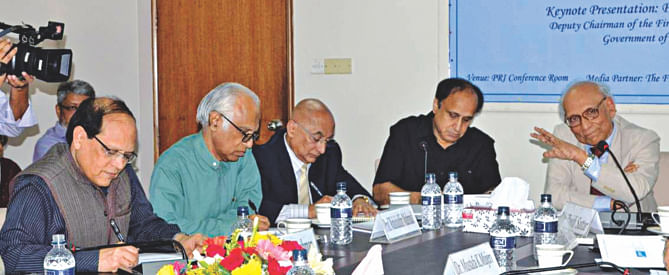Don't manipulate economic data for political upper hand
Don't manipulate economic data for political upper hand
Economist Nurul Islam says at a workshop

Bangladesh often fails to produce credible statistical data due to political pressure, causing a serious impact on policymaking, renowned economist and researcher Nurul Islam said yesterday.
“Quality data is essential for making a good policy,” he said at a workshop on policymaking and institutions in Bangladesh, co-organised by Policy Research Institute (PRI) and Bangladesh Economists Forum at the PRI office in Dhaka.
Islam, the first deputy chairman of planning commission of Bangladesh, also expressed doubts about the accuracy of GDP figures, saying political parties often force agencies to manipulate data.
“It is a big challenge for the country where democracy is not fully realised,” he said, while calling for central bank independence.
Planning machineries, the statistical agency and the central bank are the three key institutions for making reliable data, Islam said.
Atiur Rahman, governor of Bangladesh Bank, echoed the same.
A key challenge in BB's policymaking and implementation efforts is in dealing with external pressures resisting various policy reforms, he said.
Policy reforms include scaling down of capital market exposure of banks and enforcing international best practices for asset classification and provisioning, he said.
Government interferences in performance of statutory licensing and disciplining responsibilities of BB and other financial sector regulators have obstructed them in their jobs of fostering corporate governance excellence, according to Rahman.
Along with political influence, a lack of qualified staff is another hurdle to make quality statistics in the country, economist Islam said, while advising the government to place specialised staff to run the planning commission and statistical agency instead of “economic cadres”.
“Economic research is a highly technical job -- six months of training cannot groom a person.”
Wahiduddin Mahmud, an economist and a former caretaker government adviser, said reliable statistics is a capital asset for any country as it is important for calculation of trade data and credit rating.
He agreed that the estimation of GDP growth in the country is a "little weak". The government should not allow wholesale political patronisation in project selection for the sake of the country's development, Mahmud said.
AB Mirza Azizul Islam, another former adviser to the caretaker government, said the estimation of GDP growth is somewhat ambitious.
The planning machineries and statistical agencies cannot function up to international standards due to poor knowledge base and personnel selection, he said.
Mustafa K Mujeri, director general of Bangladesh Institute of Development Studies, stressed strong political commitment to improve statistical data.
He also urged the government to “put the right person in the right place” for efficient functioning of the statistical agency.
Salehuddin Ahmed, a former BB governor, called for continuity of policies after changeover of power.
It is a common phenomenon to change policies after the government changes, he added.
Shamsul Alam, a member of the General Economics Division of the planning commission, also agreed that there are some weaknesses in statistical calculation.
He stressed more political commitment to improve the performance of statistical agencies in the country.
Zaidi Sattar, chairman of PRI, also spoke, among others.